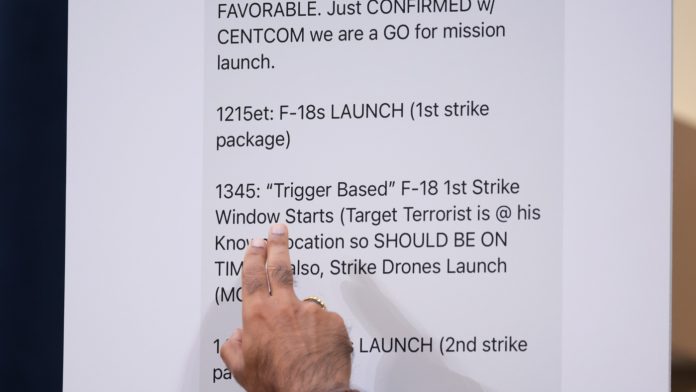A House lawmaker points to text messages by Defense Secretary Pete Hegseth during a hearing on March 26. The hearing, held by the House Intelligence Committee, addressed Trump administration officials inadvertently including a journalist on a high-level Signal group chat in which plans to bomb Houthi targets in Yemen were discussed.
Kayla Bartkowski/Getty Images
hide caption
toggle caption
Kayla Bartkowski/Getty Images
The White House continues to largely dismiss a highly sensitive discussion by leading national security officials on the open-source encrypted Signal messaging app that leaked to a reporter.
At a White House briefing Wednesday, press secretary Karoline Leavitt said the media “continues to be focused on a sensationalized story from the failing Atlantic magazine that is falling apart by the hour.”

The Atlantic‘s editor-in-chief, Jeffrey Goldberg, who was accidentally included in the Signal discussion and exposed it, published the entire text exchange Wednesday after officials minimized their actions, maintaining that nothing classified was discussed. The Signal group included the defense secretary and top intelligence officials in the Trump administration as they discussed an ongoing military operation in Yemen earlier this month. The new details about the group’s messages confirmed that Defense Secretary Pete Hegseth described specific weapons systems that would launch strikes in Yemen and that he announced the beginning of the operation more than an hour before the strikes hit.
But the leak of operational details lands a little differently with military veterans and especially with active-duty troops, who can be discharged and prosecuted for much lower-level leaks. Security breaches like what happened in the Signal group chat are called “spillage” by the military.
“What typically happens in a spillage as serious as this is they’re immediately fired,” says Kevin Carroll, who served 30 years in the Army, and in the CIA, and at the Department of Homeland Security in the first Trump administration. He says there’s no doubt what would have happened to an active-duty officer who had participated in the Signal chat.




